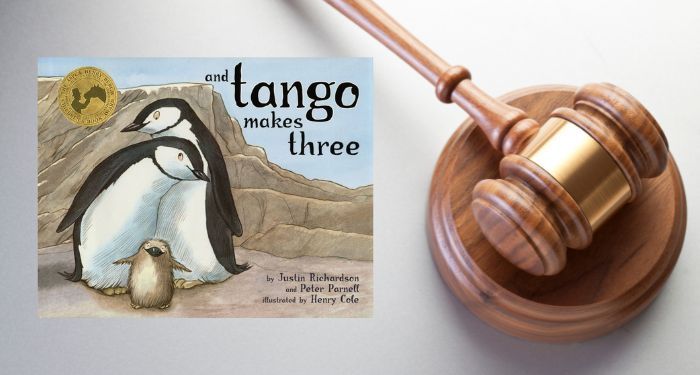
This content contains affiliate links. When you buy through these links, we may earn an affiliate commission.
Back in mid-September, Peter Parnell and Justin Richardson, authors of the frequently banned picture book And Tango Makes Three, settled a major lawsuit they filed against Florida’s Nassau County School District for inappropriately removing the book from school shelves. The lawsuit claimed that the district violated the First Amendment, as well as Florida’s Sunshine Laws, when they removed 36 books from school library shelves behind closed doors. The books, which included And Tango Makes Three–a picture book about the true story of bonded male penguins at a New York City zoo who incubated and raised an egg–were pulled despite the district not finding anything that violated Florida’s regulations on “obscene” and “sexual” content. It was done without any public input and at the behest of Citizens Defending Freedom (CDF), a Christian nationalist group that has been at the forefront of book bans in and beyond the state.
The out of court settlement required that Nassau County School District put And Tango Makes Three back on shelves with the other 35 inappropriately removed titles. Nassau County officials had to admit to wrongdoing by removing the books without following their own policies and procedures and had the agree to not removing books with which they disagree with the viewpoint or which have been highlighted by special interest groups such as CDF without following their own processes.
Parnell and Richardson’s Nassau case was not the only one they filed in the state of Florida against a school district. They also sued Escambia County School District, whose school board removed And Tango Makes Three from shelves despite a recommendation from the district’s Instructional Materials Review Committee to keep the title available. The lawsuit states that the board removed the title because of its depiction of a same-sex animal couple. The And Tango Makes Three lawsuit is one of two that Escambia Schools are navigating related to book bans. As of mid September, the district spent over $100,000 in taxpayer money defending itself against the suits.
The trial date for the case is scheduled for March 4, 2025.
This week, however, the Selendy Gay attorneys working on behalf of Parnell and Richardson have filed a motion for a summary judgement to U.S. District Judge Allen Winsor. The motion would allow Winsor to make a decision on the case without it having to go to trial, and in this case, the attorneys filed the motion based on two significant pieces of evidence that have emerged: first, the educational value of And Tango Makes Three and the lack of evidence proving that the book is harmful in the educational system and second, the personal anti-LGBTQ+ beliefs of the school board members as revealed by destroyed evidence uncovered during seven months of discovery.
Summary judgements can be requested after the discovery phase of a lawsuit. The discovery phase is when allegations are investigated and evidence is obtained to support the claims made in the dispute. A motion for a summary judgment comes when a party believes there is no dispute of material fact and that there are no questions to dispute their belief in material fact.
In other words, the plaintiffs believe evidence is crystal clear that the district removed And Tango Makes Three based on their own personal biases, rather than any legal mandate or policy.
The motion for summary judgment includes a more than 20 pages of evidence from scholar Dr. April Dawkins on the pedagogical value and power of And Tango Makes Three. She argues that the language in the book is appropriate, that the messages have value for the book’s intended audience, and that the book was well-reviewed by professionals in the field of children’s literature, education, and literacy. But even more damning for the school board is the communication between board members and the county’s–and country’s–most notorious book banner, local teacher Vicki Baggett.
This story will be developing over the next few weeks. As with the settlement in Nassau, though, it’s a huge reminder of where and how lawsuits have been a powerful way to send a message that school boards have a responsibility to not only follow both the law and policy as it relates to access to books, but to also ensure that it is the school community as a whole being served and not the board’s own interests and biases.
